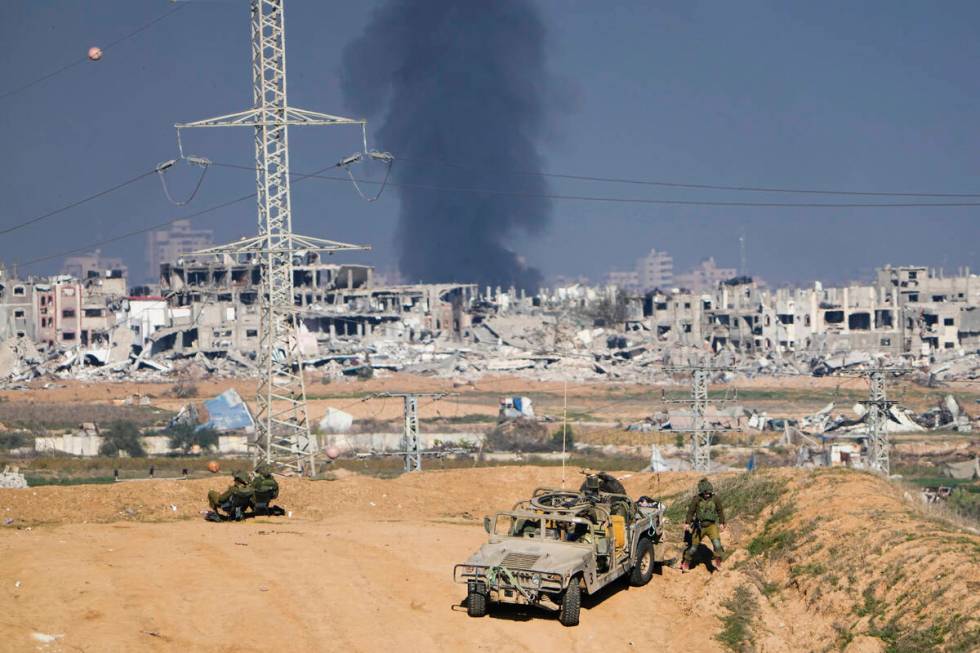IDF takes fight to tunnels as it targets Hamas leaders

RAFAH, Gaza Strip — The Israel Defense Forces are fighting in tunnels underneath the city of Khan Younis, where Israel believes Hamas’ leaders are hiding, military spokesman Rear Adm. Daniel Hagari said.
Israel’s widening campaign, which has already flattened much of the north, is now focused on the urban refugee camps of Bureij, Nuseirat and Maghazi in central Gaza, where Israeli warplanes and artillery have leveled buildings.
Hagari said finding the tunnel shafts, destroying Hamas terror infrastructure and killing terrorists is a lengthy process. “These are ambitious but important war aims because there is no other way to defeat Hamas, and it will take time,” he said.
In the north, Hagari said the military struck targets on Thursday in a way that was “painful to Hezbollah.”
Hamas terrorists have continued to fire rockets, mostly at Israel’s south.
The military says 168 of its soldiers have been killed since the ground offensive began, including three whose deaths were announced Thursday.
They are Sgt. Maj. Asaf Pinhas Tubul, 22, from the 7th Armored Brigade; Capt. Neriya Zisk, 24, from the 401st Armored Brigade; and Maj. Dvir David Fima, 32, from the 460th Light Armored Brigade. Tubul was killed in southern Gaza, while Zisk and Fima were killed in northern Gaza.
The military said that its Intelligence and Technical Haul Collection Unit in the Military Intelligence Directorate has been in charge of sifting through the material. The unit is primarily composed of reserve service personnel, and its role is to extract intelligence from the haul captured by all the combat forces in the field.
Separately, the military said that it had recovered more than 65 million files and another half-million documents, as well as operational plans, and combat doctrine from Hamas during the ground offensive so far.
Intelligence retrieved include a map and a legend recovered in Beit Hanoun in northern Gaza, enabling the military to locate tunnel shafts in the field and to destroy many of them.
Israel has vowed to bring back more than 100 hostages still held by Hamas terrorists after their Oct. 7 attack on southern Israel that triggered the war. The terrorist attack killed some 1,200 people, mostly civilians.
More than 21,500 Palestinians have been killed in the war, according to the Hamas-run Health Ministry, which does not distinguish between civilians and combatants.
Israeli officials have brushed off international calls for a cease-fire, saying it would amount to a victory for Hamas, which the military has promised to dismantle.
Displaced people
The U.N. said late Thursday that around 100,000 people have arrived in Rafah, along the border with Egypt, in recent days. The town and its surrounding region had a prewar population of around 280,000 and was already hosting more than 470,000 people driven from their homes by the war.
Almost the entire population of Gaza is dependent on international aid, including food, UNRWA head Philippe Lazzarini said Friday. Despite a U.N. resolution last week calling for an immediate and unhindered increase in the entry of aid, no increase has been seen, he said.
Lazzarini said trucks entering at Egypt’s Rafah crossing and the newly reopened Kerem Shalom crossing from Israel face long delays. Distribution within Gaza is further hampered by constant bombardment and fighting, Israeli military checkpoints and repeated cuts in telecommunications, he said, as well as by desperate crowds that often overwhelm arriving aid trucks and take supplies.
Lazzarini called on Israel to reduce bureaucratic delays on aid entry, refrain from attacks at crossing points and around aid deliveries, and to open safe routes to northern Gaza, where aid has only rarely reached.
In the latest delivery to the north, thousands of Palestinians massed outside a distribution center in Gaza City as aid trucks arrived. Footage from the scene showed people jumping onto the trucks and clinging to the sides, some throwing packages and cans of food to others on the ground.
Israeli soldiers fired on the aid convoy as it returned from the north along a route designated by the military, damaging one vehicle, UNRWA’s Gaza chief, Thomas White, said in an post on X.
Israel reviews strike
On Sunday, an Israeli strike on the Maghazi camp killed at least 106 people, according to hospital records.
In a preliminary review of the strike, Israel’s military said that buildings near the target were also hit, and that “likely caused unintended harm to additional uninvolved civilians.” In a statement Thursday, the military said it regretted the harm to civilians and that it would learn from the error.
Eylon Levy, a government spokesman, told Britain’s Sky News that the wrong munition was used in the strike, leading to “a regrettable mistake.”
“This should not have happened,” he said.
Jewish News Syndicate via Newsmax contributed to this story. Magdy reported from Cairo, Jeffery from London. Associated Press writer Tia Goldenberg contributed to this report from Tel Aviv, Israel.